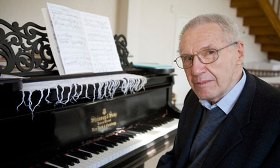|
Back
The Gift of a Single Finger New York
Isaac Stern Auditorium, Carnegie Hall
01/17/2014 -
Johannes Brahms: Klavierstücke, Opus 119
György Kurtág: Selections from Játékok: Antiphone in F-sharp – Like the flowers of the field – Hommage ŕ Jenmey – Fanfare to Judi Maros’ wedding – Hommage ŕ Schubert – (...and round and round it goes) – Farewell, S.W. – Birthday elegy for Judit-for the second finger of her left hand
Frédéric Chopin: Nocturnes, Opus 62 – Polonaise-fantasie in A-flat major, Opus 61
Ludwig van Beethoven: Piano Sonatas No. 27 in E Minor, Opus 90, & No. 21 in C Major (“Waldstein”), Opus 53
Jonathan Biss (Pianist) 
J. Biss (© Jamie Jung)
At the tender age of 34, Jonathan Biss has adopted a Titan. With two books, with an astonishingly successful on-line academic course with an ongoing recording with all the sonatas, Mr. Biss wants to make Ludwig van Beethoven his very own.
Asking whether the world needs another Beethoven specialist was like my once interviewing Albert Finney in Bangkok and asking whether the world needed another Hamlet. He looked at the sun on the Chao Phrya River and dismissed my question.
“That’s like asking if the world needs another sunset,” he appropriately sneered. “There’s no ‘best’ sunset, there’s no ‘best’ Hamlet”
And certainly no “greatest” Beethoven. Thus, in his concert last night, Mr. Biss devoted the second half to his avatar, with two Beethoven sonatas, neither of them ‘best’ but each showing Mr. Biss at his most romantic, most impulsive, and both with Titanic power.
For over a decade, Mr. Biss has been a powerhouse of technical resources, and, as the product of three generations of musicians, a genetic understanding. But he managed to provide a Beethoven which was neither cerebral or heavenly. Rather, this was the Romantic Beethoven. And while Mr. Biss looks mild on stage, one could picture the fierce acerbic old Ludwig pounding away on the keys as fast as possible. Ludwig was trying to overwhelm his royal audiences. Mr. Biss wanted to show the fierce energy beneath the notes, the battle cries amidst the brio.
There was little time (or effort) for color or subtlety in the first movement, the second movement was given short shrift. His usual rubatos in other pieces was lacking here, for he wanted to gallop ahead to the Allegretto and a wildfire prestissimo.
Did those fingers gallop with two much steam, did they sometimes get ahead of one another? That was no problem. This movement was velocity personified. This was the Titan Beethoven.
But Beethoven, the Shakespeare of composers, had gone from fire to a more philosophical nature in old age, and the 27th Sonata was an even greater challenge for Mr. Biss. The tension was always apparent, but in the second movement, he lowered down the fire just enough to give a lyric, almost Schubertian feel to the theme. This was not exactly serenity, but an artistic composure, a feeling that the world had room for Apollo as well as Dionysus.
The first half was a mixture. Mr. Biss’s decidedly romantic attitude came in the first two notes of Brahms’ late Opus 119 Klavierstücke, with a retardation that was like an introduction to all four pieces. In the final one, he could let himself go, with a Rhapsody that was far more martial than rhapsodic. Nor was Mr Bliss’s romantic fervor was overplayed in a subtle balanced Chopin.

G. Kurtág (© Boosey and Hawkes)
Mr. Biss’ rare excursions into relatively obscure music is with Central Europeans like Janácek and György Kurtág. It was the latter which I personally loved most.
Supposedly Kurtág’s hundreds of brief “games” were influenced by Webern. While that may be historically true, I find it artistic nonsense. With Webern, one is listening to quantum particles and waves. With Kurtág, one hears a single actual idea. One doesn’t think of Webern as even slightly amusing. A look at Kurtág’s titles–Elbows, Toddling, Bored, The Bunny and the Fox–and one sees the humor and the humanity.
Mr. Biss played each breath (for not one of the works was larger than a single breath) with pinprick accuracy. Whether the pieces were nine notes long or a lengthy one minute, they had a humor, a delight, and a Zen appreciation for the tiniest specks of notes.
As for the final Kurtág, Birthday elegy for Judit–for the second finger of her left hand, Mr. Bliss put away his powerful ambidexterity and allowed a single finger to give us a treasured gift.
Harry Rolnick
|